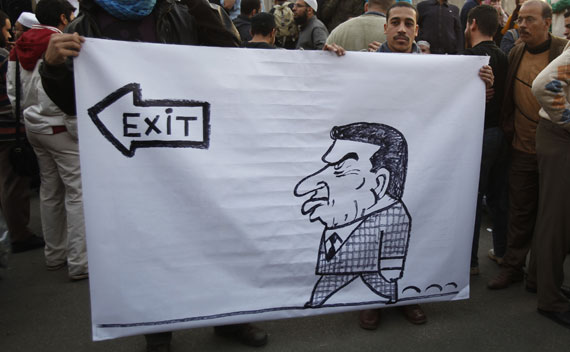Seven Thoughts on Egypt
More on:

Like many of you I spent a good portion of my weekend following events in Egypt. My colleagues Elliott Abrams, Rob Danin, and Steven Cook have been providing stellar expert commentary. You can read their assessments here, here, here, here, here, and here. (I told you they have been busy.) And things are moving fast. Last week Vice President Biden was saying that Mubarak is not a dictator. This week the administration is using the "T" word--transition. Anyway, here are seven quick thoughts.
1. Nobody knows how events will play out. Egypt has given cable news channels something new to talk about, and they have complied with wall-to-wall coverage. Some of the commentary has been well-informed; some of it not. But all the commentators share one thing in common—they are all guessing at what might happen in Egypt. In fluid situations like we are seeing right now even small decisions can have epic consequences. What will result from the interaction of thousands of individual decisions now being made in Egypt is unknowable.
2. Not all Egyptians are in the Tahrir Square. One of the great unknowns is what Egyptians who are staying at home are thinking. Does Egypt’s silent minority see the protesters as giving voice to their hopes and dreams? Or do they fear that the protests will produce greater hardship and calamity? Don’t discount the latter concern. Many Egyptians may not have much, but they also don’t want to lose what they do have. It’s easy to say from 4,000 miles away that “things can’t get any worse.” But Egyptians know that sometimes they do.
3. The Mubarak regime is about more than just Hosni Mubarak. Mubarak has held on to power for three decades because powerful segments of Egyptian society benefit from his rule. These groups now must worry that if Mubarak goes, so will their privileges and benefits. That gives them good reason to urge Mubarak to hang on.
4. Mohamed ElBaradei isn’t Egypt’s savior. ElBaradei is a hero today because has spent much of his adult life outside Egypt. He isn’t tainted by collaboration or compromise with the Mubarak government. But over time that strength is a weakness. The fact that no one owes him their allegiance means that he will be hard pressed to get people to do what he wants. Unless he is a better strategist than one would guess based on his tenure as chief of the IAEA, expect him to be pushed aside if Mubarak goes.
5. U.S. military aid gives Washington less leverage than you might think. Job#1 for Mubarak is staying in power. Everything else falls in the “worry-about-later” category. Plus Mubarak knows that if he holds on to power the Obama administration will find a way to work with him. Why? Because that’s what we have done for thirty years.
6. Economic reform will be as important as political reform for Egypt in the months to come. For all the protesters chanting about freedom, Mubarak probably would not be in hot water today if Egypt’s economy were booming like China’s. But it isn’t. Egypt falls in the bottom half of all countries ranked by GDP per capita, just behind Angola if you like IMF statistics or just behind Tonga if you prefer CIA statistics. Mubarak or his successors need to find a way to tap Egypt’s economic potential. The problem is that reforms will hurt important groups, which is why reforms are more often discussed than implemented.
7. How revolutions begin matters less than how they end. The American Revolution turned out one way, the French Revolution another. President Mubarak’s departure, if it does happen, could end well or badly. My money is on badly. The protesters agree on what they are against, not what they are for. And we may not know for a long time which outcome we are going to get. Any new government will face its own growing pains as well as a public that might have unreasonable expectations about what it can deliver and how fast. Let’s hope that the White House has begun to think through that “What if?”
More on:
 Online Store
Online Store